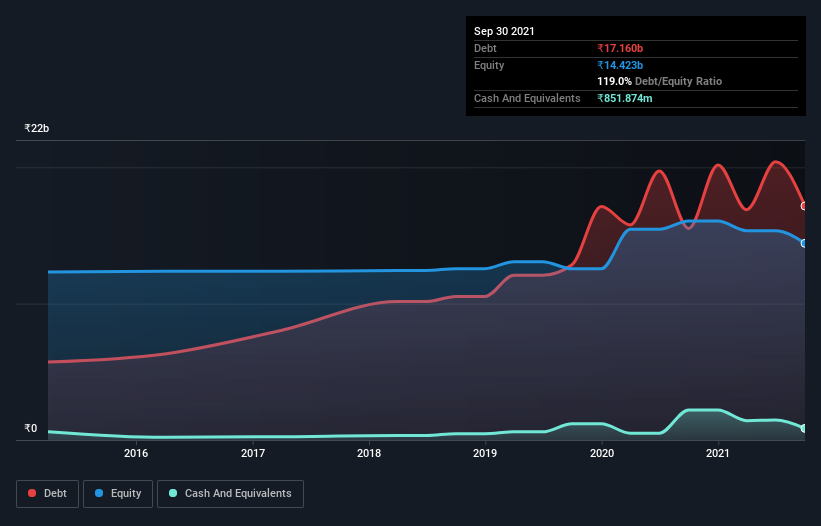Legendary fund manager Li Lu (who Charlie Munger backed) once said, 'The biggest investment risk is not the volatility of prices, but whether you will suffer a permanent loss of capital.' So it might be obvious that you need to consider debt, when you think about how risky any given stock is, because too much debt can sink a company. Importantly, Lemon Tree Hotels Limited (NSE:LEMONTREE) does carry debt. But the more important question is: how much risk is that debt creating?
Why Does Debt Bring Risk?
Debt assists a business until the business has trouble paying it off, either with new capital or with free cash flow. If things get really bad, the lenders can take control of the business. However, a more usual (but still expensive) situation is where a company must dilute shareholders at a cheap share price simply to get debt under control. Of course, debt can be an important tool in businesses, particularly capital heavy businesses. When we think about a company's use of debt, we first look at cash and debt together.
See our latest analysis for Lemon Tree Hotels
What Is Lemon Tree Hotels's Net Debt?
The image below, which you can click on for greater detail, shows that at September 2021 Lemon Tree Hotels had debt of ₹17.2b, up from ₹15.5b in one year. However, it does have ₹851.9m in cash offsetting this, leading to net debt of about ₹16.3b.

How Healthy Is Lemon Tree Hotels' Balance Sheet?
We can see from the most recent balance sheet that Lemon Tree Hotels had liabilities of ₹2.74b falling due within a year, and liabilities of ₹20.1b due beyond that. On the other hand, it had cash of ₹851.9m and ₹245.0m worth of receivables due within a year. So it has liabilities totalling ₹21.7b more than its cash and near-term receivables, combined.
This deficit is considerable relative to its market capitalization of ₹34.7b, so it does suggest shareholders should keep an eye on Lemon Tree Hotels' use of debt. Should its lenders demand that it shore up the balance sheet, shareholders would likely face severe dilution. There's no doubt that we learn most about debt from the balance sheet. But ultimately the future profitability of the business will decide if Lemon Tree Hotels can strengthen its balance sheet over time. So if you want to see what the professionals think, you might find this free report on analyst profit forecasts to be interesting.
Over 12 months, Lemon Tree Hotels made a loss at the EBIT level, and saw its revenue drop to ₹3.0b, which is a fall of 35%. That makes us nervous, to say the least.
Caveat Emptor
Not only did Lemon Tree Hotels's revenue slip over the last twelve months, but it also produced negative earnings before interest and tax (EBIT). Indeed, it lost ₹223m at the EBIT level. When we look at that and recall the liabilities on its balance sheet, relative to cash, it seems unwise to us for the company to have any debt. Quite frankly we think the balance sheet is far from match-fit, although it could be improved with time. However, it doesn't help that it burned through ₹29m of cash over the last year. So to be blunt we think it is risky. The balance sheet is clearly the area to focus on when you are analysing debt. But ultimately, every company can contain risks that exist outside of the balance sheet. For example, we've discovered 2 warning signs for Lemon Tree Hotels that you should be aware of before investing here.
If you're interested in investing in businesses that can grow profits without the burden of debt, then check out this free list of growing businesses that have net cash on the balance sheet.
New: AI Stock Screener & Alerts
Our new AI Stock Screener scans the market every day to uncover opportunities.
• Dividend Powerhouses (3%+ Yield)
• Undervalued Small Caps with Insider Buying
• High growth Tech and AI Companies
Or build your own from over 50 metrics.
Have feedback on this article? Concerned about the content? Get in touch with us directly. Alternatively, email editorial-team (at) simplywallst.com.
This article by Simply Wall St is general in nature. We provide commentary based on historical data and analyst forecasts only using an unbiased methodology and our articles are not intended to be financial advice. It does not constitute a recommendation to buy or sell any stock, and does not take account of your objectives, or your financial situation. We aim to bring you long-term focused analysis driven by fundamental data. Note that our analysis may not factor in the latest price-sensitive company announcements or qualitative material. Simply Wall St has no position in any stocks mentioned.
About NSEI:LEMONTREE
Lemon Tree Hotels
Develops, owns, acquires, operates, manages, renovates and promotes hotels, motels, resorts, restaurants in India.
High growth potential with proven track record.
Similar Companies
Market Insights
Community Narratives



